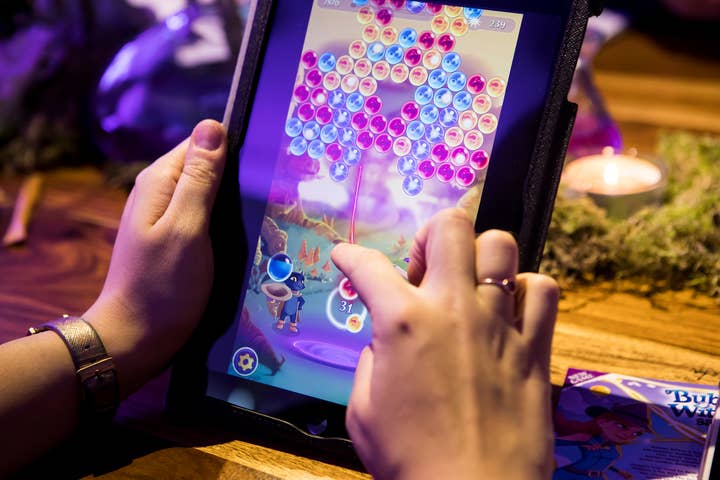King on diversity: “No company will succeed on its own here.”
Diversity and culture manager Natalie Mellin says more firms need to "show role models together" in order to address gender imbalance
More than half of the world's active game-playing consumers are female and yet the number of women working in the industry still hovers below the 20% mark in various market surveys.
While individual companies have put commendable efforts into diversifying their teams, Natalie Mellin - diversity, employer brand and culture manager at casual games giant King - says that addressing this issue needs to be a global concern.
"The World Economic Forums recent survey said that the gender gap is sliding backwards," she tells GamesIndustry.biz. "In fact, the research suggested that we wouldn't reach gender parity globally until 170 years from now.
"We need to take this seriously and ensure that we continue to push for a more diverse company so that we don't fall behind commercially. Most reports show that an increase in diversity can result in an increase in productivity, innovation and even revenue."

King has certainly benefitted from a more diverse audience. Titles such as Candy Crush Saga and the recently launched Bubble Witch Saga 3 often have as many, if not more, female players as they do male ones - and Mellin stresses the firm is doing all it can to reflect that balance in its own teams.
The importance of increasing diversity within the games industry is something King has tried to demonstrate with its own hiring practices for some time. The firm positions itself as one of the leaders when it comes to women in tech, not just games, and aims to help rectify other imbalances in the industry's workforce.
Mellin says: "Our recruitment programme is not just about getting more women into the technology industry but also to consider other areas that are commonly discriminated against in the workplace, including: age, personality, ethnicity, race and so on.
"We have millions of players around the world, from all walks of life. If we want to continue to make great games that appeal to such a vast audience then we need to make sure that our company is made up of people from different backgrounds, cultures and nationalities. Our audience is quite evenly split between female and male players and so it's important that we continue to hire more female talent who can relate to the millions of women who play our games."
"Research suggests we won't reach gender parity globally until 170 years from now. We need to take this seriously"
The King exec describes the Candy Crush firm's hiring process as "a robust recruitment programme" with "inclusion nudges throughout" that remind the HR team to think about everything concerned with how and where they are advertising job vacancies.
"If only one type of candidate sees our adverts then we won't increase our application numbers from groups that are normally underrepresented, like women in games and technology," Mellin observes.
"One of the key things we do here at King is have six people from different areas of the business involved in the interview panel. This not only ensures we get someone who is qualified for the role but also someone that fits the values of our company. This process minimises the risk for one person's unconscious bias taking part of the decision making."

"One of my favorite comments last year was from my colleague who was so excited about seeing queues for the ladies' room. So our process clearly working"
It's not just King's management who are highlighting the need for diversity. Employees from within the company's many studios around the world have formed their own employee networks, such as Women@King, Working Carers & Parents, and RoyaLGBT& Friends. Mellin says the first two have actually helped reshape the company's policies on parental leave - not just for women, but for any parent.
"These self-forming employee groups are so important to us as we need support and a constant dialogue between employees to be able to support our employees with the right initiatives," says Mellin. "They're also involved in a huge number of local and global activities like our King GDC Scholarship, which aims to take 10 young women to GDC with a special programme to help them get a foot in the door.
"One of my favorite comments last year was from my colleague who was so excited about seeing queues for the ladies' room. So it's clearly working."
The concept of diversity even filters into some of King's employee training programmes, such as the art department's 'Thinking Big' and 'Unconscious Bias' modules. But pushing for a more representative workforce is not just about satisfying critics in this increasingly scrutinous world - Mellin insists it actually improves the quality of King's output.
"One woman is not the same as another. I would love to see a truly inclusive workplace where our teams create the most engaging player experience they can for the diverse world we live in"
"The more diversity you have in a team, the more innovative and creative you can be," she says. "Of course, it helps to have representatives from different types of groups like gender, ethnicity, age and so on to further understand your customers but the key point is that we are all different.
"One woman is not the same as another. I would love to see us get to a place where we have a truly inclusive workplace where our teams can utilise their creativity to create the most engaging player experience they can for the diverse world we live in."
While it's all well and good putting King - and the many other firms with such priorities - on a pedestal for their hiring and employee support practices, efforts like this will have little impact on the global industry if more don't follow suit. And it's important not just to reach out to the talent already on the industry's rader, but future potential games makers as well.
"No company will succeed on its own here," Mellin says. "There are a lot more educated women and minorities that are interested in the industry nowadays.
"However, a recent study found that 74% of high school girls said they were interested in STEM subjects but only 18% of degrees in Computer Science are held by women. For King, this means we need to prioritise initiatives for hiring and future talent.
"We need to show role models together with others in this industry to show girls growing up that this as a viable and interesting career option to pursue. Within the technology and gaming industry you can be as creative as you like and you're encouraged to be inspired and make a difference."
